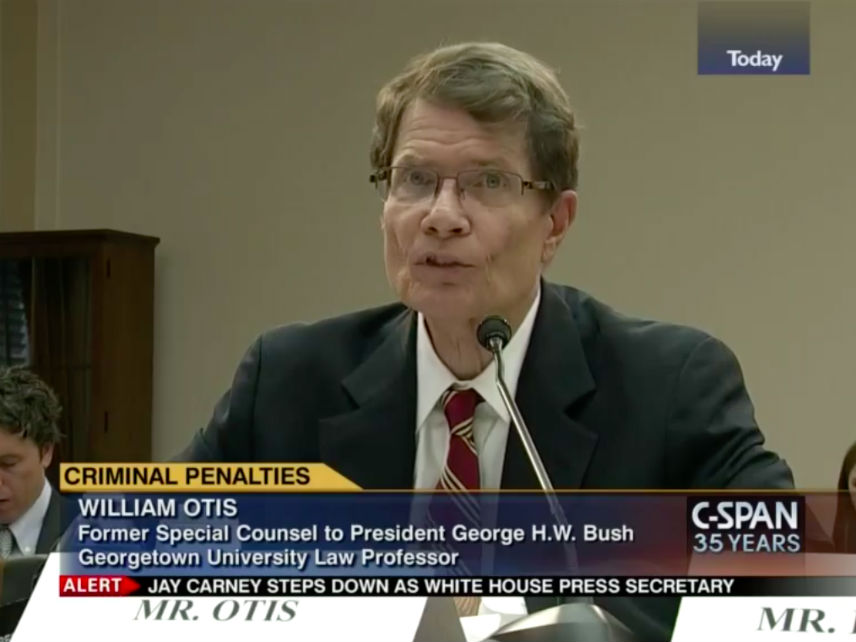Trump Nominates Man Who Called for Abolishing U.S. Sentencing Commission to U.S. Sentencing Commission
Bill Otis has made a career out of opposing any reductions to mandatory minimum sentences.

President Donald Trump has nominated former prosecutor and current Georgetown Law adjunct professor William Otis to the U.S. Sentencing Commission, a body that Otis once said should be abolished.
Otis is a notorious opponent of attempts to roll back mandatory minimum sentences and mass incarceration. He's a familiar face to anyone who's followed debate on the issue, mostly because he's often the only person news outlets and conference organizers can still find who's willing to speak out bluntly in support of mandatory minimums.
"Two facts about crime and sentencing dwarf everything else we've learned for the last 50 years," Otis said at a 2014 Federalist Society gathering. "When we have more prison, we have less crime. And when we have less prison, we have more crime."
Otis' appointment to the U.S. Sentencing Commission—a bipartisan, independent agency within the judiciary responsible for articulating federal sentencing guidelines—drew reactions of horror and condemnation from criminal justice advocates.
"Bill Otis is a terrible choice," says Jason Pye, the vice president of legislative affairs at FreedomWorks, a conservative organization that has supported criminal justice reform. "Really, anyone who approaches criminal justice policy with an antiquated worldview is a bad choice for such an important post."
Jonathan Blanks, a research associate at the Cato Institute's Project on Criminal Justice, says Trump's nomination of Otis "signals another step back into the discredited 'tough on crime' policies of the 1980s."
"Otis's support of lengthy mandatory minimum sentences is outdated and counterproductive to effective criminal justice policy," Blanks continues. "If confirmed, my hope is that Mr. Otis makes himself familiar with the reams of data that undermine his previously expressed positions on the efficacy of mandatory minimum sentencing."
The choice is also interesting because Otis once said the commission should be scrapped altogether.
"Pending repeal and replacement of the [Sentencing Reform Act of 1984], Congress should abolish the Sentencing Commission," Otis testified at a 2011 House Judiciary Committee hearing. "By far the most important purpose for which it was created no longer exists—to write binding rules for district courts to use in sentencing. It does have some secondary functions—for example, to study possible statutory improvements, as well as gather and publish statistics about sentencing practices—but when its core function has been demoted to making increasingly ignored non-rules, it's time to turn the page."
Otis also played a role in efforts to scuttle the Smarter Sentencing Act, a 2014 sentencing reform bill and a precursor to the current bipartisan legislation moving through the Senate.
As a lengthy 2015 Slate profile explained, Otis thinks giving judges leeway to depart from mandatory minimum sentences is just a way to coddle violent criminals. And when that happens, his logic goes, crime rises.
Otis has warned time and time again over his career that criminal justice reforms would lead to chaos in the streets, but as Julie Stewart, the founder of Families Against Mandatory Minimums, wrote in Reason in 2015, he has been wrong over and over. For example, when Congress reduced the sentencing disparity between crack and powder cocaine, Otis predicted the bill, which he dubbed the "Crack Dealers Relief Act," would result in "misery" once thousands of crack dealers would be "put back on the street prematurely."
Stewart writes:
Fortunately for those of us concerned about public safety, Otis was wrong again—amazingly wrong. Since passage of the [Fair Sentencing Act (FSA)], the crime rate, the prison population, and crack usage are all down! It bears repeating. Otis said the changes would cause "misery" and "inevitably lead to more crime." Instead, while thousands of offenders have received fairer sentences, the crime rate has fallen, crack use is down, and taxpayers have saved millions from being wasted on unnecessary prison costs.
The U.S. Sentencing Commission found that crack offenders who got shorter sentences because of the FSA reoffended at slightly lower rates than crack offenders who served their full-length sentences. Again: less prison time, more public safety.
"Otis is impervious to facts and evidence," Warren concluded.
If confirmed by the Senate, Otis will bring that dedication to facts and evidence to a commission he wishes didn't exist at all.


Show Comments (30)